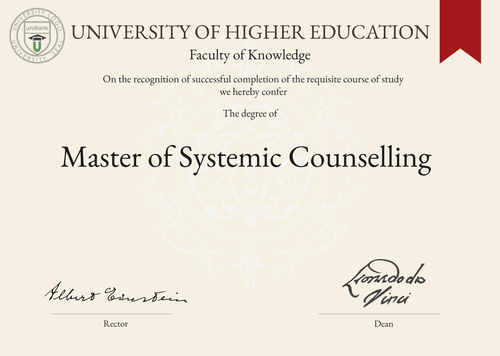
Master of Systemic Counselling (MSc in Systemic Counselling)
Guide to Master of Systemic Counselling Program/Course/Degree
Master of Systemic Counselling (MSc in Systemic Counselling)

Program Name:
Master of Systemic CounsellingProgram or Degree abbreviation:
MSc in Systemic CounsellingDuration range:
Typically 1-2 years full-time or 2-4 years part-timeTuition range:
Varies depending on the country and university, ranging from $10,000 to $30,000 per yearOverview:
The Master of Systemic Counselling program is designed to provide students with advanced knowledge and skills in the field of systemic counselling. This program focuses on understanding and addressing individual, couple and family issues within a broader social and cultural context. Students will learn various therapeutic approaches and techniques to help clients navigate their personal and relational challenges.Curriculum Overview by year:
The curriculum is typically divided into different modules or courses that cover foundational theories, practical skills and specialized topics. The specific courses may vary depending on the university, but generally, the program includes: - Year 1: Introduction to Systemic Counselling, Family Systems Theory, Counselling Techniques, Ethical and Legal Issues in Counselling - Year 2: Advanced Systemic Counselling, Couple and Family Therapy, Group Counselling, Research Methods in CounsellingKey Components:
The key components of the Master of Systemic Counselling program include theoretical knowledge, practical skills development, supervised clinical practice and research training. Students will have the opportunity to apply their learning in real-world settings through internships or practicum placements.Career Prospects:
Graduates of the program can pursue various career paths in the field of counselling. They may work as systemic counsellors in private practice, community agencies, mental health centers, or educational institutions. They can also find employment opportunities in family therapy clinics, marriage counseling centers, or government organizations.Salary Expectations:
The salary expectations for systemic counsellors can vary depending on factors such as location, experience and work setting. On average, systemic counsellors can earn between $40,000 and $70,000 per year. However, it is important to note that salaries may vary significantly based on the chosen country, location and specific job market conditions.Conclusions:
The Master of Systemic Counselling program offers a comprehensive education in the field of counselling, focusing on systemic approaches to therapy. It equips students with the necessary knowledge, skills and practical experience to work effectively with individuals, couples and families. It is important to consider that program duration, tuition fees, curriculum, key components, career prospects and salary expectations can vary depending on the chosen country or location of study, as well as the specific university offering the program. Visitors interested in pursuing this degree can search for institutions worldwide through the uniRank World Universities Search Engine to find the most suitable options.World Universities Search Engine
search for Master of Systemic Counselling (MSc in Systemic Counselling) and add the Location (country, state etc.) or specific University you are interested in studying at.
Query examples:
- Master of Systemic Counselling (MSc in Systemic Counselling) United States
- Master of Systemic Counselling (MSc in Systemic Counselling) United Kingdom online
- Master of Systemic Counselling (MSc in Systemic Counselling) Australia international students
- Master of Systemic Counselling (MSc in Systemic Counselling) University of California
- Master of Systemic Counselling (MSc in Systemic Counselling) University of London tuition fees
- Master of Systemic Counselling (MSc in Systemic Counselling) University of Sydney scholarships
Share Program/Course
Interesting? Share this program/course/degree info with your friends now.